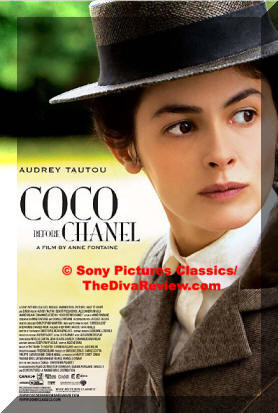|
 The
story of Gabrielle Bonheur Chanel has been told many times on film,
stage and in books. The woman who became the world’s best-known schmatte-designer
lived a life as unique as the fashions she created. Coco Before Chanel
takes a look back at the foundations of the real House of Chanel. The
story of Gabrielle Bonheur Chanel has been told many times on film,
stage and in books. The woman who became the world’s best-known schmatte-designer
lived a life as unique as the fashions she created. Coco Before Chanel
takes a look back at the foundations of the real House of Chanel.
Opening with young Gabrielle being dumped at an orphanage by her
uncaring father, we see through the young girl’s eyes her attention to
the stark monochromes of the nun’s habits that would influence her own
sense of colour and style. We catch up with Gabrielle and her sister as
teens in a local café singing peppy songs about their lost dog, Coco,
for tips. The only real tip she earned was having the appellation adhere
and become her famous nickname. While splitting time between working in
a tailor shop and singing in bars, Coco manages to hook herself a rich
playboy by pretty much turning up at his mansion and refusing to leave.
Sweet! After first living with him as his backstreet girl of sorts, Coco
asserts herself in little ways; first taking over her lover’s wardrobe
and creating fetching mannish outfits for herself that shock and amuse
his friends, then by designing stylish chapeaus for his bevy of
influential female pals. One visitor to the estate, another wealthy
man-about-town, is Arthur “Boy” Capel, the man who provides Coco with
the initial financial backing to begin her dream of designing and
quickly becomes the love of her life.
Amazing how a life so thoroughly lived as Chanel’s could come off so
flat onscreen. Filled with capable performances by the supporting cast;
particularly Benoît Poelvoorde as Balsan, Chanel’s first brush with
wealth and the very embodiment of the Gallic shrug, Poelvoorde plays
Balsan as a wastrel too jaded to be bothered over much, including his
mistress’ unconcealed love for another man. Poelvoorde balances the
absurdity of his situation with this entirely unsuitable suited woman
with off-hand humour, while managing to be quite cruel to the
impoverished Gabrielle without ever really meaning to be.
Alessandro Nivola is dreamy in marcelled hair and beautifully cut tuxedos as “Boy”
Capel, the man who sweeps Coco off her feet and proves to the cynical
orphan that love exists even for someone as scarred as she. As Chanel,
our star, Audrey Tautou is lovely to look at; her liquid eyes
intelligent and searching, but there’s not a whole not more to her
performance than looking really great in classic Chanel fashions. We
see her in modified menswear, the first little black dress and the
striped shirts and bellbottoms Chanel copied from French fishermen that
became France’s unofficial uniform. Her Chanel is a flatline,
displaying none of the designer’s passion and precious little of the
flaming temper that history has told us so much about. If this wasn’t
the story of Chanel, no one would really care for this person because
she’s not written very interestingly. I wanted to know more about the
ladies of questionable repute she designed for early on, than Chanel
herself. The revelations that led up to the Chanel signatures like the
aforementioned striped shirts, little black dress and masculine suits
and trousers are amusing, but certainly not enough to hold the interest
of anyone who doesn’t care about those things beforehand.
This Coco
Chanel is so hollow we get no insight as to how she felt living as what
would have been termed then, a fallen woman; an unusual courtesan with
no artifice, carrying on as the kept woman of one rich man while
beginning an affair with another that will carry on past his marriage.
Outside of Tautou looking fabulous (- Though not filmed particularly
kindly) in a host of Chanel designs; it’s not even that great
looking a production. Stephen Frears’ Cheri from earlier this year does
a far better job displaying the beauty and overripe lushness of the
fading Belle Époque and its demimonde than does director Anne Fontaine
with Coco Before Chanel.
The film is the only biopic approved by the
House of Chanel, clearly for its utter topicality and lack of challenge
to Chanel’s mythos. How sad that the film that should have been the
last cinematic word on the early life of the iconic Coco Chanel ends up
being little more than a shallow, listless Gallic version of a Lifetime
for Women TV-movie with only half the resonance.
~ The
Lady Miz Diva
Sept.
23rd, 2009
© 2006-2022 The Diva Review.com
|
